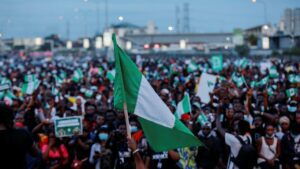
2023 General elections: Time citizens must act as custodians
Nigeria is at the edge of another season of crossroads. The reality of conditions before the Country, however, make the 2023 General Election coming forth in few months, a subject of critical concern. The unpalatable state of living conditions, amidst negativities of various fabrics of the society have made the call for citizens to be, more than before, careful and thorough in the selections of candidates who will bear rule in custody of public offices for another regime, has been one rational campaign in right perspective.
On the choice of deciding candidates to assume political offices for another political season, the call for doing same wisely, has become resonating. Such call has largely been premised on the ground that whether the Country would experience worsening of conditions or turning point unto the yearnings of the thrust of growth and development longed for, is dependent on the choice of candidates settled for in the forth coming General elections. Former President Olusegun Obasanjo on Wednesday, the 10th August, 2022, had spoken on why Nigerians should not afford to make wrong choices during the 2023 General elections. He warned that making the wrong choice in the election may consume the nation. The former President who spoke in Lagos as the special guest of honour at the Wilson Badejo Foundation’s 15th annual lecture with the theme, ‘Overcoming the twin challenge of poverty and insecurity in Nigeria’ had said progress for the nation is tied to making the right choice in 2023. “It is either we make the right choice in 2023 because if we make the right choice, we would get there. However, if we do not make the right choice in 2023, things would consume us and we pray against that one. We must make the right choice in 2023, Nigeria is not where it is supposed to be today. If anyone says it is ok where we are at the moment, then the person’s head needs to be examined,” he had said.
Essentially, the question of the disposition of the masses to the subject of choice, pose pregnant issues of concern. Issues relating to money politics, do-or-die politics, winner-takes-it-all syndrome on the part of politicians are much in view as characteristics of the Nigerian political climate. On the part of the populace, more importantly, issues of apathy, vote selling, ethno-religious nepotistic, and pecuniary leanings, have been pronounced; but yet elections must hold for transition of government, in as much as the standing order of the embraced system settled for in the Country is democracy.
However, while apathy setting in recently has become pronounced, it is noteworthy the failure of governments of successive administrations, which had informed same cannot be expunged from the prevailing political culture of the masses, with deficient dispositions some of which have been mentioned above. It is noteworthy that some of these deficient dispositions, are what politicians have learnt to exploit to have their ways during elections. Thus, having been able to manoeuvre their ways through, by optimising the cultural inadequacies, becoming responsible in government becomes of less concern to them – hence, the successive recycling of political officer holders with records of failure which have borne the disappointment informing why many recently are staying far from the polls, believing there is no essence for same, since same set of politicians recycled into offices have largely behaved similar ways with insignificance for development, but rather deterioration of conditions.
To say there are no competent hands to rule the Country within the Nigerian political space, however, would deeply be questionable and controversial; hence that may not be the case, but rather, the case would have to be that such candidates, who hold the credence, may not come near the appeals of majority of the masses who form the electorates. Hence, the subject of intelligence in election has come to bear. It is such orientation to election where the choice of candidates by electorates are determined by critical and informed perusal of the political climate, sieving the system to weigh the candidates vying for various positions, and reaching an informed decision on the best suitable candidate for each position in contest, voting for same, bereft of any touch of ethno-religious, myopic, and nepotistic sentiments. This would be the way to go.
By this, bringing on board candidates whose track records have proven the veracity of competence would be the driving force informing election and emergence of candidates, capable of running and meeting the demands of public offices as informed by in-depth consideration of their track records of competence, which informed the choice of the electorates at the polls, against leanings on any form of sentiment.
It is within this purview that Nigerians can track their representatives for accountability, having set in place a culture where from the on-set, the orientation and pathway that informed the election was borne by intelligent sorting of the political space, sniffing for the best hand for every office and choosing same at the polls, which really gives enlightened understanding to the reflections of election process and not mere selection activities.
As the General elections draw close, the need for the Nigerian populace to rise to become custodians of the process is pertinent. Rising up to same would demand intelligent engagement and participation. It is when such positive disposition, birthing the rise of enlightened political culture is set in place, that Nigerians themselves can really become the custodians of democracy in their own Country. Assuming this status, would form the foundation for a systemic culture where accountability would come take a pride of place, as every citizen would have to rise to the responsibility of intelligently engaging the system. At this point, the pathway to the degree of political consciousness would be formidable, where it becomes practically difficult for politicians to play pranks on the intelligence of the populace.


